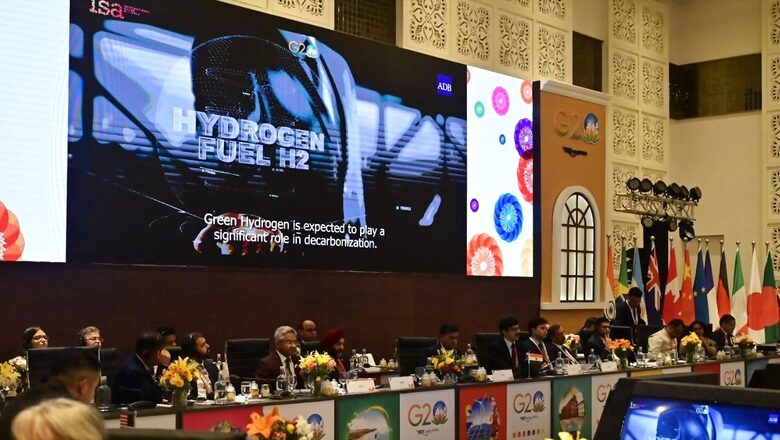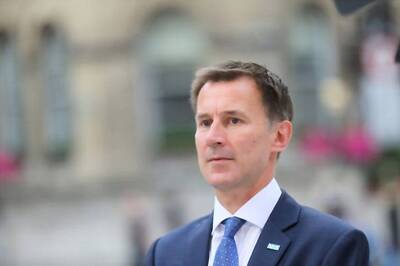
views
Despite a staggering increase in climate-related disasters, the final meeting of the G20 Energy Transition Working Group failed to issue a joint call on phasedown of unabated fossil fuel.
The crucial meeting concluded in Goa after intense negotiations that saw G20 countries locked in an intense debate over language around global security and energy transition.
The meeting, however, failed to produce a joint communique, following which the Indian G20 presidency issued a final outcome document.
FOSSIL FUELS PHASEDOWN
Experts weighing in on the outcome say the summary document failed to include language on the phasedown of unabated fossil fuels, instead it skirted around ambiguous language. While some G20 members emphasized on the importance of making efforts towards phasedown of unabated fossil fuels in line with different national circumstances, others believed that abatement and removal technologies will address such concerns.
“It’s disappointing that the issue of fossil fuel subsidies remains absent from the agenda and that there is no call for a fossil fuel phasedown while extreme weather events are multiplying across the globe. The G20 countries urgently need to uphold their commitment to eliminate inefficient fossil fuel subsidies that exceed 1 trillion dollars globally in 2022,” said Siddharth Goel, Senior Policy Advisor, International Institute for Sustainable Development (IISD).
Dr. Tan See Leng, Minister for Manpower and Second Minister for Trade and Industry, Singapore, met Hon'ble Minister of Power and New & Renewable Energy Shri Raj Kumar Singh on the sidelines of the Energy Transitions Ministerial Meeting in Goa today.#G20India #G20Summit #etwg pic.twitter.com/UgtvDWClkL— Office of R.K. Singh (@OfficeOfRKSingh) July 22, 2023
TRIPLE RE INSTALLATIONS BY 2030
Experts highlight the summary statement did not reflect on the urgency to triple global renewable installations by 2030 to keep the 1.5°C target alive. The statement was watered down drastically from initial deliberations with the final version broadly calling for a “tripling of clean technology capacity”.
“The outcome gets us no closer to a net zero world by 2050. Without calling for more robust policies and targets that can rapidly scale up the deployment of wind and solar energy and other renewables, the call for efforts to triple zero and low emission technologies ring hollow,” said Ben Backwell, CEO, Global Wind Energy Council. “The final statement is a watered down affirmation of business as usual.”
According to Tarun Gopalakrishnan, Pre-Doctoral Fellow, Climate Policy Lab, Centre for International Environment Policy, the fight over energy pathways seemed to be continuation of the disagreement at COP27 over phasing down “all fossil fuels”.
India had supported the call because it wanted oil and gas to be treated similar to coal, which the world agreed to phasedown, but not “phase out” at COP26 at Glasgow. “This has been the best diplomatic solution, but it is not the best climate policy solution,” he said.
Hon'ble Minister of Power and New & Renewable Energy Shri @RajKSinghIndia today launched the Green Hydrogen Innovation Centre (GHIC) at the Energy Transitions Ministerial Meeting, under #G20 India Presidency, in Goa.#GreenHydrogen #etwg pic.twitter.com/qnpyfV7cz4— Office of R.K. Singh (@OfficeOfRKSingh) July 22, 2023
NEED FOR URGENT CLIMATE ACTION
The meeting discussed a host of issues including accelerating energy efficiency and renewable energy, phasing out fossil fuels, and increasing finance for the energy transition. “Some of the issues were discussed for the first time in the G20,” remarked Madhura Joshi, Senior Associate at E3G. “But the final text marks out the divisions between countries. Now the pressure lies on G20 leaders to set an ambitious agenda in September, which will be critical for determining the tone and success of COP28.”
The meeting also stressed on the importance of climate finance and urged developed countries to fulfil their commitments to deliver on the goal of jointly mobilizing $100 billion per year by 2020 and through 2025 in the context of meaningful mitigation action.
Experts are also concerned that the language used in the final outcome endorses zero- and low-emission hydrogen, which includes hydrogen produced from gasified coal as long as it is supplemented with Carbon Capture Usage and Storage (CCUS). In a way, it promotes ‘low emissions’ technologies to produce hydrogen, which could open up the risk of using fossil-based sources for its production.
Highlighting that the contentious negotiations on energy transition to deliver on Paris targets are becoming increasingly fraught with national interests, Aarti Khosla, Director, Climate Trends, said, “The decision text shows how some countries with large fossil fuel interests have pushed to maximise false solutions even while aiming for net zero goals. India has been an honest and fair broker listening to all competing interests and the final document is a reflection of the need to satisfy a spectrum of geopolitical interests on areas which impacts all nations and their growth and development- energy transition pathways, critical minerals for such minerals, and the accelerated deployment of clean renewables.”




















Comments
0 comment